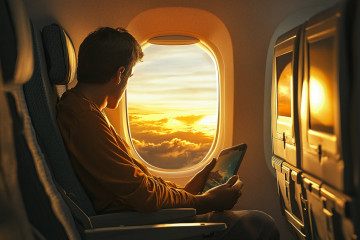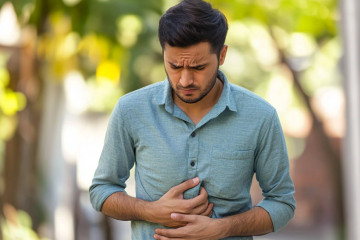Pay attention to your diet + exercise
Of course, you had a 7-hour layover at JFK and mindlessly ate too much to avoid roaming around the terminal. You (thankfully!) slept over much of the Atlantic. But then you had to run to your gate at Heathrow to make your final connection.
When you’re traveling, it’s no wonder you can wind up with digestive system problems like constipation or diarrhea, says colorectal surgeon Sarah Vogler, MD.
“There are a lot of habits related to comfortable bowel movements,” Dr. Vogler says. “Just a change in what you eat or drink can affect your digestive system. Even switching the bathroom that you use ― to one that isn’t your own ― can cause anxiety for some people because it takes them out of their regular routine.
The best way to maintain regularity and avoid or treat constipation and diarrhea while traveling? It’s sticking to your regular eating and drinking habits as much as possible, Dr. Vogler says.
A few key tips to help you stay regular
1. Drink plenty of water and clear fluids. This may not completely relieve constipation if you have it, but it can at least soften stools so they are easier to pass.
One of the causes of constipation is dehydration, Dr. Vogler says, so drinking water, fruit juice or clear liquids will keep you hydrated. Avoid drinking a lot of alcoholic or caffeinated beverages. Both also dehydrate you. Push yourself to drink even more water than you normally do because traveling alone can increase dehydration.
2. Avoid extra fiber. High-fiber foods in combination with dehydration can actually cause an increase in abdominal bloating and constipation. It’s important to maintain a healthy diet with fruits and vegetables. But eating more fiber than usual is not recommended. For regularity’s sake, Dr. Vogler typically recommends getting one to two servings of vegetables and one to two servings of fruit every day.
And since it’s not always easy to find healthy snacks on the go, plan ahead.
3. Avoid foods that are high in fat. Vacations are meant to be fun. But if you can, avoid excessive amounts of unhealthy snack foods and desserts like candy, cheese, pizza, processed foods, chips and ice cream. They can make your constipation worse.
“Granted, it’s sometimes hard to maintain your dietary routine on vacation,” Dr. Vogler says. “You may not eat the healthiest foods, and you may eat on the run a lot more when you’re traveling. But realize that can also cause constipation.”
4. Exercise and stay physically active. To keep your digestive system moving, you need to keep your body moving. Schedule stretching breaks, especially if you’re in a car, plane, bus or train for long periods. Hike, bike or swim when you can.
5. Get plenty of rest. Sometimes people don’t sleep as much on vacation, and that can throw off your system.
6. Don’t ignore your body’s signals. If your body is telling you to go to the bathroom, don’t put it off because you’re only near a public restroom or don’t want to interrupt your sightseeing. If you ignore the urge, Dr. Vogler says, it can lead to or worsen your constipation.
7. Plan for bathroom breaks that match your routine. Try to maintain your schedule, if you always use the bathroom at a certain time of day.
If you’re concerned about using public bathrooms, try to give yourself time to relax and make yourself as comfortable as possible. Read a newspaper or magazine to relax or listen to music from your phone or other device with ear buds. “But if you don’t have a bowel movement within 10 minutes, move on,” Dr. Vogler says. “Try again when you feel the urge.”
8. Use laxatives wisely. If diet and exercise don’t help your constipation on the trip, don’t be afraid to take a laxative. Just use them wisely and only for a short time, Dr. Vogler says. Starting with a gentle stool softener (such as MiraLAX® or Colace®) is safe and easy.
If you commonly experience constipation while traveling, then it’s safe to start taking a stool softener prior to your departure and continue this daily during your trip. It isn’t recommended to start taking an additional fiber supplement while traveling.
Diarrhea can also be a problem
Eating something that has bacteria in it or drinking contaminated water can give you diarrhea when you travel. But it’s not only Montezuma’s revenge that’s to blame!
Sometimes, changes in your regular diet, exercise and bathroom routines (the same things that can cause constipation) are enough to bring on loose stools, Dr. Vogler says.
Being prepared is always a wise option. Be sure to pack an over-the-counter or prescription anti-diarrheal medicine to help you treat it. A daily probiotic can also help to regulate the bacteria in your colon.
But the best advice? Eat and exercise like you always do. “Traveling is a time to watch your diet and other routines more, not less,” Dr. Vogler says.



1 Comment
best price for generic prozac